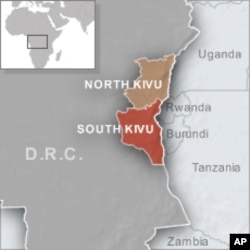The aid organization OXFAM says the number of women, children and even men who were raped recently in the Eastern DRC is now about 500. That’s about double the figure currently being used by the United Nations.
The rapes took place in late July and early August in villages in North and South Kivu Provinces.
Tuesday, a senior U.N. peacekeeping official said the United Nations “failed” to protect the hundreds of women and children who were raped and gang raped. At U.N. headquarters in New York, Atul Khare, the under-secretary-general for peacekeeping operations, said U.N. actions were “inadequate, resulting in unacceptable brutalization of the population.”
Among those reacting to the testimony is Marcel Stoessel, OXFAM’s country director in the DRC, who describes ongoing rapes in the country as “outrageous and a scandal.”
“We at OXFAM certainly agree with that statement that the actions of the United Nations, particularly the MONUSCO force, were not appropriate in this case,” says Stoessel, who’s in the capital, Kinshasa. “It’s just one of many examples how MONUSCO failed to properly communicate with the population and ask them what they need.”
MONUSCO is the United Nations Organization Stabilization Mission in the Democratic Republic of Congo. It took over from the former U.N. peacekeeping mission known as MONUC.
“Seemingly,” says Stoessel, “MONUSCO was present quite close to where the incidents happened. Now having said this, it’s the first and foremost responsibility of the government of the DRC to protect its citizens.”
So many rapes, so many responsible
“There are now up to 500 mass rapes reported,” he says, “if we count together the different horrible incidents we’ve been hearing. And all of this happening over a very short period of time,” he says.
But the OXFAM county director adds, “This is by no means abnormal if you look at these horrendous statistics – 15,000 women, children, sometimes boys and even men, are raped in DRC (each year). It’s just not so concentrated in a particular period of time and in a particular place.”
The figure of 15,000 is the number of reported rapes. Stoessel says the actual figure is much higher.
“Research undertaken by OXFAM has shown that 60 percent of the perpetrators or the suspected perpetrators are armed men. And it’s all sides,” he says. This includes FDLR rebels, the Mai Mai militia and even members of the Congolese army.
“In a recent study that we carried out across North and South Kivu,” he says, “the Congolese army was actually identified by the communities as the number one perpetrator of sexual violence.”
He’s quick to point out that not all members of the army are complicit in the rapes, but rather what he called “elements.”
What can be done?
Tuesday, U.N. peacekeeping official Khare called for better radio communication in areas of the DRC where there is no mobile phone network. He also said the MONUSCO had started additional evening and random patrols. In addition, peacekeepers now have a list of questions to ask villagers about threats to their safety.
Stoessel says, “I think that’s definitely a very, very positive step forward. Some of these measures have actually been taken in the DRC in other areas and have improved the security situation of the population. We’ve been asking for these measures for years and it really took this scandal now for a big push to be made, especially, I should emphasize, the communication aspect.”
The OXFAM official says many of the peacekeepers do not speak French, highlighting the need for interpreters.
“What communities are telling us over and over again is that these peacekeepers don’t get out of their armored vehicles. They are patrolling in heavy armored vehicles across the main roads.”
Stoessel says gunmen simply hide and wait for the vehicles to pass.
“What the communities want to see in the most sensitive areas, in the most risky areas, they want to see the peacekeepers with their boots on the ground so that they are visible and [are] a real deterrent,” he says.
He says action can be taken to stop or sharply reduce the number of rapes in the DRC.
“Yes, it can be done, but it will take a long and sustained effort by the government of Congo and by the international community.”
The government, he says, must establish its “legitimate authority over the entire territory.” And those in the Congolese army and police who are responsible for sexual assaults must be rooted out and brought to justice.




